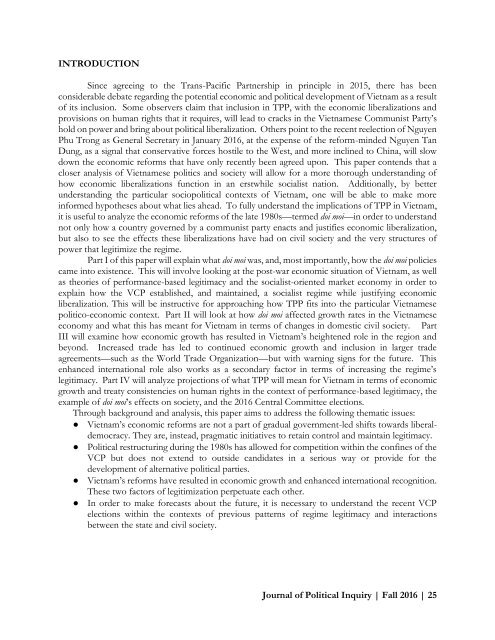Fall2016_Final2
Create successful ePaper yourself
Turn your PDF publications into a flip-book with our unique Google optimized e-Paper software.
INTRODUCTION<br />
Since agreeing to the Trans-Pacific Partnership in principle in 2015, there has been<br />
considerable debate regarding the potential economic and political development of Vietnam as a result<br />
of its inclusion. Some observers claim that inclusion in TPP, with the economic liberalizations and<br />
provisions on human rights that it requires, will lead to cracks in the Vietnamese Communist Party’s<br />
hold on power and bring about political liberalization. Others point to the recent reelection of Nguyen<br />
Phu Trong as General Secretary in January 2016, at the expense of the reform-minded Nguyen Tan<br />
Dung, as a signal that conservative forces hostile to the West, and more inclined to China, will slow<br />
down the economic reforms that have only recently been agreed upon. This paper contends that a<br />
closer analysis of Vietnamese politics and society will allow for a more thorough understanding of<br />
how economic liberalizations function in an erstwhile socialist nation. Additionally, by better<br />
understanding the particular sociopolitical contexts of Vietnam, one will be able to make more<br />
informed hypotheses about what lies ahead. To fully understand the implications of TPP in Vietnam,<br />
it is useful to analyze the economic reforms of the late 1980s—termed doi moi—in order to understand<br />
not only how a country governed by a communist party enacts and justifies economic liberalization,<br />
but also to see the effects these liberalizations have had on civil society and the very structures of<br />
power that legitimize the regime.<br />
Part I of this paper will explain what doi moi was, and, most importantly, how the doi moi policies<br />
came into existence. This will involve looking at the post-war economic situation of Vietnam, as well<br />
as theories of performance-based legitimacy and the socialist-oriented market economy in order to<br />
explain how the VCP established, and maintained, a socialist regime while justifying economic<br />
liberalization. This will be instructive for approaching how TPP fits into the particular Vietnamese<br />
politico-economic context. Part II will look at how doi moi affected growth rates in the Vietnamese<br />
economy and what this has meant for Vietnam in terms of changes in domestic civil society. Part<br />
III will examine how economic growth has resulted in Vietnam’s heightened role in the region and<br />
beyond. Increased trade has led to continued economic growth and inclusion in larger trade<br />
agreements—such as the World Trade Organization—but with warning signs for the future. This<br />
enhanced international role also works as a secondary factor in terms of increasing the regime’s<br />
legitimacy. Part IV will analyze projections of what TPP will mean for Vietnam in terms of economic<br />
growth and treaty consistencies on human rights in the context of performance-based legitimacy, the<br />
example of doi moi’s effects on society, and the 2016 Central Committee elections.<br />
Through background and analysis, this paper aims to address the following thematic issues:<br />
● Vietnam’s economic reforms are not a part of gradual government-led shifts towards liberaldemocracy.<br />
They are, instead, pragmatic initiatives to retain control and maintain legitimacy.<br />
● Political restructuring during the 1980s has allowed for competition within the confines of the<br />
VCP but does not extend to outside candidates in a serious way or provide for the<br />
development of alternative political parties.<br />
● Vietnam’s reforms have resulted in economic growth and enhanced international recognition.<br />
These two factors of legitimization perpetuate each other.<br />
● In order to make forecasts about the future, it is necessary to understand the recent VCP<br />
elections within the contexts of previous patterns of regime legitimacy and interactions<br />
between the state and civil society.<br />
Journal of Political Inquiry | Fall 2016 | 25
















